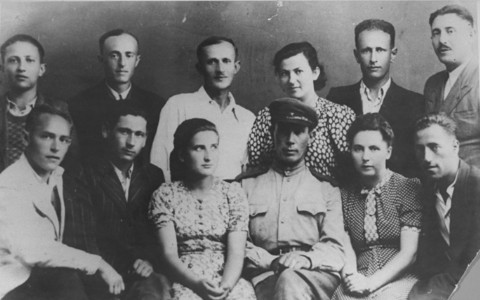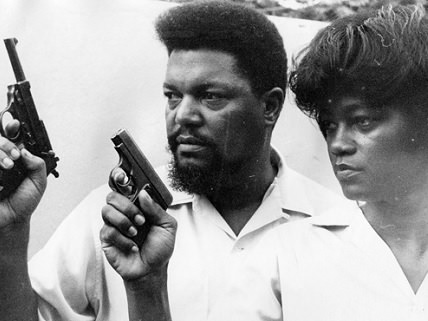In Charles C.W. Cooke’s fantastic piece in National Review last week on the power of emotion in the gun debate, he made an excellent point; the gun debate is about more than just cold numbers.
Much more.
Influence: I grew up in a family that was very uncomfortable around guns. My mom didn’t let me have toy guns when I was a kid; and while I enthusiastically built my own, parts of the whole distaste rubbed off on me.
Until I was about 14 years old. Then, on one of my sojourns through the history section at the Jamestown public library, I found a copy of The Black Book – a collaborative record of the history of Nazi atrocities against the Jews in Europe, and of Jewish resistance.

Maybe I was way too young to read it. Maybe it caught me in my formative years. Maybe it warped me.
All I know is, nobody ever had to teach me “Never Again”.
And it occurred to me; barring the Jews that managed to get out before the war started, or the lucky few who were hidden and smuggled away by the resistance, the Jews that survived were the ones who found guns, and fought their way through the war.

And even from the depths of Concentration and Extermination camps, access to even a few guns bought some lucky, tenacious Jews a shot at survival.

And even if they didn’t survive – was it not better to die on ones feet, facing the enemy, maybe taking a few with, than to be slaughtered like sheep? To be an instrument of God’s vengeance, in some way small or large?
(There is a sliver of the academic grievance-mongering community that believes memorializing those who were able to fight back is prejudiced against those who died without fighting. Nonsense. Anyone who says they would or would not be among those who, under mortal but imponderable threat, absolutely would leave the world of the normal to go out and fight against an enemy that seems, at that moment and in that place, omnipotent and unbeatable, has been watching too many movies. Although having the mindset is a good start. At any rate, that particular bit of grievance-mongering is simply daft; do you think those who died in the gas chambers begrudged those who fought in the forests the shot they’d taken at freedom? Do you not think those who fought in the forests fought, as best they could, on behalf of the victims who could not? This sort of academic navel-gazing repulses me at a level too deep to discuss).

And so, even when I still called myself a “liberal”, maybe even a “progressive”, I slowly, furtively began feeling my way toward being a Second Amendment supporter.
It’s been accepted as a truism among Real Americans for decades – there’s never been a totalitarian dictatorship in a country with civilian gun ownership. It’s not entirely true – the Nazis allowed some tightly regulated civilian guns – but one of the first of the Nuremberg restrictions on Jewish life barred Jews from having guns.

It was the first, necessary step on the road to the Holocaust – denying the Jews the actual ability to be more than a speed bump on the way to extinction.
And I, and every Real American who learned the right lessons from history, live “never again” every day we go to the range.
Enforcing Non-Violence: But one needn’t go to Europe, or even back seventy-five years, to find oppressed citizens winning their freedom through force of arms – in this case, the threat of it.
Martin Luther King gets a lot of credit – justifiably so – for leading the fight for civil liberty for blacks in South at the end of the Jim Crow era. And even when I was in school, not all that long after the fact, we were taught that King’s victory was a victory of non-violent resistance.

And it was true – in places like Montgomery and Birmingham, where and when the northern, urban media was there to keep a spotlight on things.
But much of the battle for justice and political equality was fought outside the glare of the media’s Klieg lights, in sharecroppers shantytowns and hollers and delta villages that hadn’t changed much since the Civil War.

And there – as documented in the book This Non-Violent Stuff’ll Get You Killed, by Charles Cobb – it was black men and women, World War II veterans and lone activists and mutual-self-defense groups, with hunting shotguns and war-surplus rifles and relics handed down from God only knows when, black people seeking equality, their franchise and their justice stared down the Klan over open sights, deterring the worst of the violence, just as their great-grandparents, back from the Union Army, had nearly a century before.

Even King himself carried a handgun through most of his travels, and his home was reportedly an “arsenal”.
Nicholas Johnson goes back further than Cobb, in Negroes and the Gun: the Black Tradition of Arms. The case is convincing; had blacks not been able to deter Klan and supremacist violence in the sixties, the battle for equality would have been at the very least an incredibly bloody one, and at worst been either impossible, or a fault-line leading to another civil war.
All Together Now: So we are a nation that is built on not merely the idea of freedom, but the notion that it’s our job to stay that way. We are a people who know that government is at best imperfect at protecting us from crime, much less insulating us from tyranny. And we – the ones who pay attention – know that at times, heaven forefend, it’s The People’s job to seize that freedom back.

And while the gun-grabbers ascribe a lot of motives to Real Americans’ struggle, from “defending gun industry profits” to “compensating for something, yuk yuk”, those are the reasons that keep us fighting, year in, year out. They are the reasons we, the Real Americans, are the most successful grass-roots political movement in recent years.
And they are the reasons we can not rest on our laurels. Evil never sleeps. Either can we.
There you go, Heather Martens and Kim Norton and Barack Obama. That’s why we fight.
And why you will lose.
To Sum It Up In A Sentence: Freedom is endowed to us by our creator – but not everyone got the memo; history shows that the need to deter or repel threats to freedom, and life, are lamentably common.
This Series:
- Part I: “History“
- Part II: Enemies Foreign and Domestic
- Part III, Tomorrow: The Public Good
- Part IV, Thursday: The Underdog
Leave a Reply
You must be logged in to post a comment.